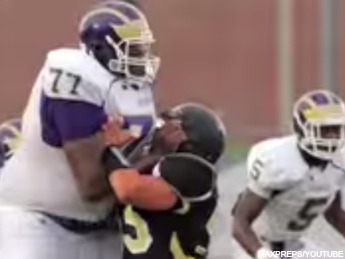Dondre Harris is, by almost any measure, a giant. At 7 feet tall and 375 pounds, he's got a body that can go toe-to-toe with Shaq. When his high school's football coach saw him walk out of a cornfield while working a summer job, the sales pitch was almost immediate.
How about you apply that huge body to football?
Harris gave it a try, but it wasn't the natural fit you might expect. Size is a valued asset in football, but so is speed. After trying out on the offensive line, he proved too slow-footed to stop defensive players. On defense, he had a little more success, proving to be a bulldozer with raw skills but tons of potential.
Even so, colleges weren't tripping over themselves to make Harris an offer. With such a massive body and so little football experience, Harris seems like a classic recruiting gamble: If he doesn't work, you're out a scholarship slot. If he does work out, you've got a near-unstoppable menace.
In the end, all he earned was a scholarship to a Division II university. Which begs the question: Is Harris really too big for football?
As those around Harris explain in a feature from Bleacher Report's Adam Kramer, coaching ears did perk up when word of a giant football prospect came up. Some coaches called, others requested tape. The tape itself wasn't too impressive, his high school coach admits, but eyewitness accounts insisted that his true impact was hard to see on a screen.
Even so, the initial buzz surrounding the behemoth wasn't supported by convincing on-field performances.
"After a while," Harris tells Bleacher Report, "they just started losing interest."
The prevailing concern from coaches was that, despite his size, the foot speed he displayed was just too slow -- he wasn't fast enough to break past blockers and put real pressure on the backfield, and he didn't have the closing speed to chase down ball carriers.
Harris had done a good job bringing his weight down to 375 from an original 450 pounds, but it wasn't enough to increase his speed. In a way, his massive size proved to be his strength as well as his weakness.
That doesn't mean football was a lost cause. Harris did show improvements and become a respectable contributor for his high school team. He did receive offers to play at the college level, and he signed with Fairmont State in Virginia.
For Harris, football's rewards don't require attending a powerhouse program or working toward an NFL career.
"He's just happy," says his high school coach. "And his mother is happy that he's going to school in the fall."
Harris has a lot of work ahead if he wants to be competitive in Division II, but with the help of strength coaches and additional on-field experience, he might be able to refine his game. But football remains a secondary pursuit.
"My main focus is school," Harris said. "I'm going to get my education. That comes before everything."





